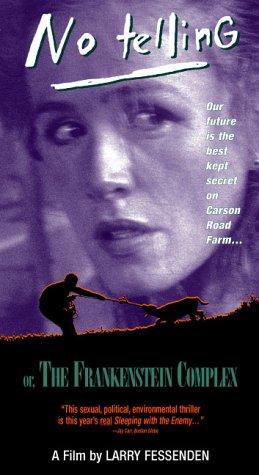 This ecologically-minded horror fest is a unique concoction is every sense. The premiere effort by New York’s Larry Fessenden, it’s a disturbing, eye-opening update on the age-old mad scientist subgenre, not as strong as HABIT, Fessenden’s second film, but superior to his vastly overrated third feature WENDIGO.
This ecologically-minded horror fest is a unique concoction is every sense. The premiere effort by New York’s Larry Fessenden, it’s a disturbing, eye-opening update on the age-old mad scientist subgenre, not as strong as HABIT, Fessenden’s second film, but superior to his vastly overrated third feature WENDIGO.
NO TELLING (1991), HABIT (1997) and WENDIGO (2001) apparently comprise a trilogy, intended by their creator Larry Fessenden to “reinvigorate the enduring clichés of the horror genre with new and unexpected implications”, although all are quite different in their respective approaches. With NO TELLING Fessenden was in an environmental frame of mind, having been inspired by Rachel Carson’s classic ecological tract SILENT SPRING. He set out to create a horror flick with ecological concerns and made a concerted effort to create an environmentally-friendly shoot, which apparently resulted in “much infighting and ideological clashes” among the crew. The resulting film (retitled THE FRANKENSTEIN COMPLEX in Europe) was not a success, and remains fairly obscure today, but is at least available on DVD from World Artists Home Video.
Lillian moves with her hubbie Geoffrey to a modest country house for an apparent summer retreat. What she doesn’t know is that Geoffrey, who works for a pharmaceutical research company, has moved them to this remote area so he can conduct nasty experiments on unsuspecting animals away from the public eye. He sets up a laboratory adjacent to their home where he does strange things to rats. Later he captures a local dog in an ancient bear trap and does something unspeakable—and only partially glimpsed—to it. Finally Jeffrey buys a calf from a farmer and ends up clubbing it to death so the locals won’t notice him dragging it back to his lab.
In the meantime Lillian has become suspicious of her husband’s activities. Her concerns are enflamed by Alex, a hunky environmentalist with whom she embarks on a tentative affair. Lillian suffers from nightmares involving white lab coat-wearing freaks, blood and body bags. One night she tries to investigate Geoffrey’s laboratory but he stops her before she can see much, which only intensifies Lillian’s suspicions. The next day she spots a sign about a missing dog, and she and Alex decide to confront Geoffrey.
They end up catching Geoffrey in the act of videotaping the dog he captured, which has been turned into a grotesque dog-calf hybrid that doesn’t live long. A confrontation ensues between Geoffrey, Lillian and Alex.
Fessenden might have had horror movie clichés in mind when he conceived NO TELLING, but his approach, as his subsequent films attest, is quite individual. He’s got a real feel for landscapes yet always keeps the dialogue and interactions of his characters front and center. The performances are generally strong and the special effects, consisting of hideous eviscerations and a mutant dog-goat critter, do their job admirably considering the extremely low budget. Another plus is the disarmingly serene Michael Nyman-esque score by Tom Laverack, which makes for an effective contrast with the oft-gruesome imagery.
With so many good things, I really wish the film were better overall. It lacks the cohesion of Fessenden’s HABIT, with a fragmented cutting style and frequent show-offy camerawork (particularly annoying: the “That Seventies Show”-esque swish pans from one character to another). I also wish Fessenden had made more of an effort to get inside the head of his main villain Geoffrey rather than present him in simplistic mad scientist fashion. The fact that the horrors this film presents are all reality-based and sanctioned by society is a sobering one, and deserves a better overall treatment. NO TELLING is effective, but its creator hadn’t yet found his cinematic footing.
Vital Statistics
NO TELLING
Glass Eye Pix
Director: Larry Fessenden
Producer: Rachel Horovitz
Screenplay: Larry Fessenden, Beck Underwood
Cinematography: David Shaw
Editing: Marco Chermayeff
Cast: Miriam Healy-Louie, Stephen Ramsey, David Van Tieghem, Richard Topol, Ashley Arcement, Robert Brady, Susan Dee, Ward Burlingham, J.J. Clark, Stanley Taub, Francois Lampietti, John Van Couvering, Larry Fessenden
